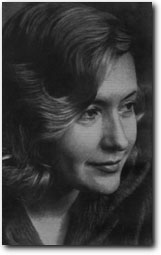|
ЗИНКА
Памяти однополчанки - Героя Советского Союза Зины Самсоновой.
1.
Мы легли у разбитой ели.
Ждем, когда же начнет светлеть.
Под шинелью вдвоем теплее
На продрогшей, гнилой земле.
- Знаешь, Юлька, я - против грусти,
Но сегодня она не в счет.
Дома, в яблочном захолустье,
Мама, мамка моя живет.
У тебя есть друзья, любимый,
У меня - лишь она одна.
Пахнет в хате квашней и дымом,
За порогом бурлит весна.
Старой кажется: каждый кустик
Беспокойную дочку ждет...
Знаешь, Юлька, я - против грусти,
Но сегодня она не в счет.
Отогрелись мы еле-еле.
Вдруг приказ: "Выступать вперед!"
Снова рядом, в сырой шинели
Светлокосый солдат идет.
2
С каждым днем становилось горше.
Шли без митингов и знамен.
В окруженье попал под Оршей
Наш потрепанный батальон.
Зинка нас повела в атаку.
Мы пробились по черной ржи,
По воронкам и буеракам
Через смертные рубежи.
Мы не ждали посмертной славы.-
Мы хотели со славой жить.
...Почему же в бинтах кровавых
Светлокосый солдат лежит?
Ее тело своей шинелью
Укрывала я, зубы сжав...
Белорусские ветры пели
О рязанских глухих садах.
3
- Знаешь, Зинка, я против грусти,
Но сегодня она не в счет.
Где-то, в яблочном захолустье,
Мама, мамка твоя живет.
У меня есть друзья, любимый,
У нее ты была одна.
Пахнет в хате квашней и дымом,
За порогом стоит весна.
И старушка в цветастом платье
У иконы свечу зажгла.
...Я не знаю, как написать ей,
Чтоб тебя она не ждала?!
1944
|
ZINKA
in Memory of a Soldier, Hero of the Soviet Union, From My Unit
(*)
We lay down by the broken fir
tree
To wait for the first light of
dawn.
Under one greatcoat we kept
warm
On the chilled, damp ground.
"You know, Yul'ka, I seldom am
sad
But I do feel so sad today:
Home, far away, amidst apple
orchards
My old mother waits for me.
"To her it seems that every
tiny bush
Pines for her restless
daughter.
You know, Yul'ka, I seldom am
sad
But I do feel so sad today."
We had barely time to warm up
When came the sudden marching
order.
Again, in a greatcoat beside me
Marched the fair-haired
soldier.
Without singing, pep talks or
colours
Our division went into battle,
And our battered battalion
Was surrounded in Poles'ye.
Our Zinka led us in the attack.
We broke through a black field
of rye,
Running across bomb craters and
gullies
Toward death-dealing enemy
trenches.
We didn't seek posthumous fame
--
Wanting to live covered with
glory!
So why the blood-soaked
bandages
On the prone fair-haired
soldier?
I clenched my teeth as I
covered
Her still body with my
greatcoat,
And Belorussian winds
mournfully sang
Of far-away apple orchards in
Ryazan'...
"You know, Zinka, I seldom am
sad,
But I do feel so sad today:
At home, far away, amidst
apple orchards
Your old mother waits for you.
"I've friends and I've a
lover,
But you were her only
daughter.
The cabin smells of bread
dough and smoke;
Spring is seething beyond the
door."
In a flowered dress, the old
woman
Lit up a candle in front of an
icon ...
I just can't bring myself to
write her
And tell her not to wait for
you.
|
|
